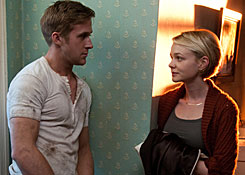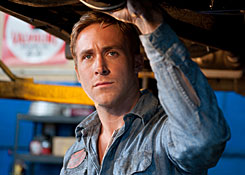
Interview Date: 09/07/2011
Run Date: 09/16/2011
Interviews Home / Movies Home / Bullz-Eye Home
No disrespect to Keri Russell or Justin Timberlake, but Ryan Gosling is easily the most powerfully versatile actor to emerge from that thespian crucible we call the Mickey Mouse Club. He's done very well playing relatively straightforward leads in "Fracture" and the chick-flick phenom, "The Notebook," but the 30-year-old Canadian with an oddly urban accent has specialized in playing a wide variety of oddballs and doing it better than anyone of his generation. Viewers of edgy indy cinema were put on notice back in 2001 with Gosling's astonishing tour de force performance as a young orthodox Jew turned anti-Semitic skinhead in Henry Bean's outstanding "The Believer." Since then, he's gone on to earn deserved rave notices for playing a troubled husband in last year's "Blue Valentine" and a well-meaning but highly delusional super-dweeb courting a sex doll in 2007's "Lars and the Real Girl." He earned his first Oscar nomination as a conscientious crackhead history teacher in the outstanding 2006 drama, "Half Nelson." He's been nominated twice for a Golden Globe and has won an Independent Spirit Award. More nominations and awards for more offbeat roles seem certain.
Although he's being taken plenty seriously as an actor, Gosling has nevertheless had to contend with a burgeoning heartthrob image fostered by his "Notebook" role and his reported real-life relationships with Sandra Bullock, Rachel McAdams, Olivia Wilde, and, most recently, Eva Mendes. The funniest result was a net meme poking fun at the actor's sensitive boy-next-door looks promulgated by a site called Fuck Yeah, Ryan Gosling. His blushing but good-humored embrace of the meme in a pair of MTV segments probably only fed the flames; his highly praised role as a highly successful lothario in the Steve Carrell comedy, "Crazy, Stupid, Love" probably hasn't hurt, either.
No wonder, then, that Gosling is rushing headlong into vastly less cuddly terrain. He'll soon be seen in the dark political drama “The Ides of March,” with actor-director George Clooney. Right now, he can be seen going way into the violent dark side of life with the rather remarkable thriller, "Drive." From Danish filmmaker Nicolas Winding Refn, it's a fascinating blend of 70s/80s aesthetics, true romance and deliberately ugly brutality. Based on a short novel by James Sallis, it stars Gosling as an unnamed young man – called "The Driver" in the credits – whose skill at automobile stunt work and get-away driving blends into his attachment with a pretty young wife and mother (Carey Mulligan) with increasingly bloody consequences. Describing his attraction to the film, Gosling says, "I've always wanted to be in a violent John Hughes movie. I always thought that if 'Pretty in Pink' had a head smashing, it'd be perfect."
He was more serious than you might think when he said that. And so it went as a very interesting Mr. Gosling spoke with Bullz-Eye and other journos about his latest film.
On his unusual relationship with violent cinema and on being a head-smashing "superhero."
When I was a little kid, when I first saw "First Blood," it put a spell on me. I thought I was Rambo; I even thought my face felt like Sylvester Stallone's face when I touched it. I went to school the next day. I put steak knives in my Fisher Price Houdini kit, and I took 'em, and I threw them at all the kids at recess. I got suspended, rightfully so, and I'm sorry and I learned my lesson and I never did anything like that again. But my parents said, "This guy can't watch movies, or violent movies anyways." They put me on a leash and I could only watch Bible. National Geographic movies, and black and white comedies, Abbott and Costello...
"I like driving, but I don't necessarily need to drive fast, to do stunts, and I don't like that in movies, necessarily. I just like getting in the car and driving around because it puts me under some kind of spell. When I get somewhere, I don't remember the drive. I like to listen to music when I'm driving. So, I had this feeling like the movie could be about driving, not about stunts and going fast."I understand the effect that movies can have on you, and the kind of spell that they can cast on you. When I first read this script, I felt like this is a guy who's just seen too many movies. He's going around acting like he's the hero of his own action movie. I wanted to play a superhero, but all the good ones are taken. I thought, "Well, I can create my own, potentially."
On shooting the soon-to-be-notorious, hyper-ultraviolent elevator scene.
We didn't have a lot of money on this movie. So, "Irreversible" has a head smashing in it, which is the best head-smashing I've ever seen. So, we called [the film's writer-director] Gaspar Noé and we asked him. "First of all, can we do a head smashing and, second of all, how did you do that?" He told us how, but we didn't have the money that they had to do it.
We basically made these prosthetic heads to smash that didn't look anything like the guy, and they were squashed like grapes with one kick. It was almost like "Who Framed Roger Rabbit?" Cartoonish. So, when you're shooting, it has a completely different [feeling]. You're very aware of the falseness of it... But I think Nicholas did a very great job of eliminating all those elements and making it a very visceral and scary transformative scene for the character.
Also, we used a werewolf metaphor throughout the movie, that Driver thought he was a werewolf. [He] had never turned into one but was convinced that he had to potential to [become one]. In that scene, the werewolf is unleashed.
On the mythic side of "Drive."
 Los Angeles is, in a way, fairy tale land – based and built on fantasy. The only way this movie was really going to resonate on a deep level for the audience, if you aren't from Los Angeles, is if we dug into the mythology of these characters and this story. So, we started to treat the Driver as a knight and Irene [Carey Mulligan's character] as a princess locked in a tower and [Albert Brooks' crime boss] Bernie Rose as an evil wizard and Ron Perlman [Nino, a more violent crime boss] as the dragon that needs to be slain.
Los Angeles is, in a way, fairy tale land – based and built on fantasy. The only way this movie was really going to resonate on a deep level for the audience, if you aren't from Los Angeles, is if we dug into the mythology of these characters and this story. So, we started to treat the Driver as a knight and Irene [Carey Mulligan's character] as a princess locked in a tower and [Albert Brooks' crime boss] Bernie Rose as an evil wizard and Ron Perlman [Nino, a more violent crime boss] as the dragon that needs to be slain.
Dialogue wasn't necessary any more. In some ways, if you eliminated the dialogue – people are smart. They can see how someone is feeling. You don't need to tell them. We just took away everything that wasn't necessary... I think you can say more that way. Once you put a word to it, it pins it, and makes it that.
On driving and the making of "Drive."
I like driving, but I don't necessarily need to drive fast, to do stunts, and I don't like that in movies, necessarily. I just like getting in the car and driving around because it puts me under some kind of spell. When I get somewhere, I don't remember the drive. I like to listen to music when I'm driving. So, I had this feeling like the movie could be about driving, not about stunts and going fast.
When I met with Nicolas... we had a terrible first meeting; it was like a terrible first date. He didn't talk to me or look at me. He was totally [uninterested] in being there, or at least it seemed that way to me. In retrospect, I learned that he was high on American cold medication. It was like one of those dates where you know you're not going to get any action so you just say, "Let's call it. Get the check." He needs a ride home now, because he doesn't drive.
"I'm not that good looking. I'm a pretty weird looking guy. I know that, but that's the magic of movies. If you play somebody who is a romantic lead it casts that spell and people believe that about you, but it's not true. Every role I ever got until I played in 'The Notebook' was the weirdo, freak, psychopath, nerd, outsider character guy."I'm [thinking] "How can this guy make a movie about driving if he doesn't drive?" I have to take him home, and we're in the car. It's awful. We're not talking, so I turn on the radio and REO Speedwagon comes on, [it's] "I Can't Fight This Feeling Anymore." Suddenly, the guy comes to life. He starts crying and singing at the top of his lungs. He says, 'This is it. It's a movie about a guy who drives around listening to music," which is how I'd been feeling. So, I knew that we were on to something. What I love about the movie is that it would have never been made if REO Speedwagon hadn't come on the radio.
The movie kept going in that direction in that we would drive around all night, go to the 101 Diner. Talk. We'd drive around and listen to music. We'd edit the film and then we'd go to work in the morning and shoot it. Then, when we were done shooting, we'd go back to driving around, listening to music, editing at night, and watching movies. Watching the film is a good representation of what the experience of making it was like.
More on working with "Drive" director Nicolas Winding Refn, best known previously for such hyperviolent slices of cinema as the acclaimed "Bronson" starring Tom Hardy and the Danish "Pusher" trilogy.
Look, ever since Nicolas was a little boy, his mother has been telling him he's a genius and everything he did was genius. Even when he was watching "Texas Chainsaw Massacre" while he ate his cereal before he went to elementary school in the morning. Obsessively, she believed he was a genius. I think that, you get told that enough, eventually it becomes true. I'm not sure that he really started out as one, but I do believe he's become one.
 He is a very unfiltered filmmaker. He just makes what he wants to see. If it's boring to him, he won't shoot it. He fetishizes things, in a way... He sexualizes things because he can't maybe be as sexual as he'd want to be [because he's married]. He talks about filmmaking a lot like having sex. It has to arouse him and has to be sexually interesting to him, even if it's a pair of gloves or where you hand is in the frame. It has to literally turn him on.
He is a very unfiltered filmmaker. He just makes what he wants to see. If it's boring to him, he won't shoot it. He fetishizes things, in a way... He sexualizes things because he can't maybe be as sexual as he'd want to be [because he's married]. He talks about filmmaking a lot like having sex. It has to arouse him and has to be sexually interesting to him, even if it's a pair of gloves or where you hand is in the frame. It has to literally turn him on.
On why being the constant subject of acclaim and awards speculation is harder than you'd think.
What's difficult about praise is that, when you get into this, most people tell you that it's not possible or that you can't do it. Nobody believes in you when you're starting out, but for a few people. You learn not to care or listen to what people think because, if you did, you would be too afraid to try. Then, suddenly, people decide that they like what you're doing and then they want to praise you, and suddenly you're supposed to start caring again. If you do, you're still taking the same risk and in some ways it cheapens your relationship to the people who did believe in you when nobody else did.
On whether his good looks creates any pressure to be a less of an actor's actor who creates totally new performances from film to film, as opposed to a traditional movie star with an ongoing persona.
I'm not that good looking. I'm a pretty weird looking guy. I know that, but that's the magic of movies. If you play somebody who is a romantic lead it casts that spell and people believe that about you, but it's not true. Every role I ever got until I played in "The Notebook" was the weirdo, freak, psychopath, nerd, outsider character guy. I was playing neo-Nazis and gay football players and doing a bunch of weird kids' TV.
You can follow us on Twitter and Facebook for content updates. Also, sign up for our email list for weekly updates and check us out on Google+ as well.











